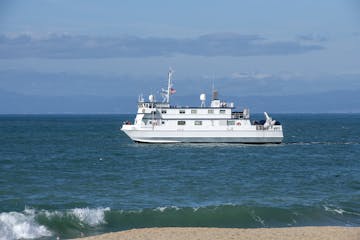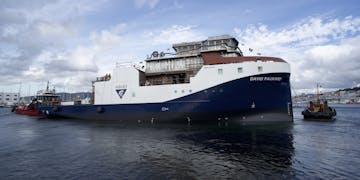MBARI’s groundbreaking work to explore the ocean would not be possible without the support of a skilled marine operations team who crew the research vessels that are critical platforms for science and engineering. Thanks to their leadership and support at sea and on shore, MBARI researchers are able to deploy remotely operated vehicles (ROVs) and autonomous robots to reveal the secrets that lie beneath the ocean’s surface.
2022 found MBARI’s marine operations at a crossroads. Last year, we bid farewell to our flagship research vessel, the Western Flyer, and prepared to welcome its replacement, the David Packard.
Constructed in 1996, the Western Flyer represented David Packard’s vision of developing innovative new platforms to better access and explore the ocean. The ship was specially built as a platform to deploy, operate, and recover ROVs. The Western Flyer hosted MBARI’s custom-built ROV Tiburon. In 2008, Tiburon was retired, and the following year the Western Flyer became the base of operations for a newer, more powerful ROV, the Doc Ricketts. Both vehicles allowed MBARI researchers to explore ocean depths up to 4,000 meters (2.5 miles).

After 25 years and more than 500 research cruises, the Western Flyer completed its final MBARI mission last September. It leaves behind a rich legacy of accomplishments.
The Western Flyer has been critical to MBARI’s work to document deep-sea biodiversity. Using the Western Flyer and its ROVs Tiburon and Doc Ricketts, MBARI researchers described a remarkable crown jelly, an unusual harp sponge, and even a new species of bone-eating worm named in honor of the Western Flyer, plus several other fascinating deep-sea species. Innovative technology on the Doc Ricketts has helped our team map Monterey Canyon in finer detail and document the community of life on the rocky slopes of Sur Ridge.
During its quarter-century at MBARI, the Western Flyer traveled beyond its home base of Monterey Bay, allowing researchers to study underwater volcanoes around Hawaii, the history of earthquakes and tsunamis in the Cascadia Subduction Zone along the Oregon coast, and hydrothermal vents in the Pescadero Basin in Mexico’s Gulf of California.
The Western Flyer will begin an important new chapter, inspiring and educating a new generation of ocean explorers. The ship will soon become a sailing classroom for the Florida Institute of Oceanography (FIO).
FIO consists of 32 members, including state universities. Established by the Florida Board of Governors and hosted by the University of South Florida, FIO provides support and shares marine science resources between the state’s universities and private, non-profit marine research entities. FIO operates the R/V Weatherbird II, R/V Hogarth, and the Keys Marine Laboratory (KML) in Layton, Florida.
Last year, MBARI granted the Western Flyer to FIO’s host university for use as a sailing classroom, providing an opportunity for students who dream of a career in ocean science, engineering, and marine operations to learn about the ocean.
FIO will provide students with a unique mix of at-sea and on-shore training and mentoring that will build ocean science, engineering, and maritime trade skills. The Western Flyer’s twin hull design means it is much more stable than more common monohull vessels. This stability makes it a particularly good platform for novice sailors.
The new program will focus on engaging students from historically black colleges and universities, minority-serving institutions, and tribal colleges. The Western Flyer will help make careers in ocean science, engineering, and conservation more accessible to everyone who is passionate about the sea.
“The Florida Institute of Oceanography is thrilled to help write the next chapter of the Western Flyer’s story. We see tremendous opportunity to use this floating classroom to increase access to marine science and build a future ocean STEM workforce that reflects a rich diversity of people, backgrounds, and experiences.” —Florida Institute of Oceanography Director Monty Graham
MBARI believes ocean exploration and technological innovation are deeply interdisciplinary activities that benefit from diverse teams guided by a shared passion, mission, and vision. The MBARI team is thrilled that our beloved vessel will inspire new ocean explorers who will help us better understand our amazing blue planet and preserve it for future generations.
The formal transfer of the vessel took place on November 29, 2022. The Western Flyer remained docked in Moss Landing as MBARI’s marine operations team helped transfer their extensive knowledge of the ship and its operations to the FIO team.
On February 10, 2023, the Western Flyer set sail to Florida via the Panama Canal. It arrived in Tampa, Florida, mid-March. Next, it will undergo shipyard maintenance while FIO prepares for pilot missions off Florida’s west coast in the summer and fall.
As the Western Flyer sailed into the sunset, we marked a major milestone in the construction of our new state-of the-art research vessel last October.

On February 10, 2023, the Western Flyer departed Moss Landing for the last time and set sail for Tampa, Florida. Image: Todd Walsh © 2023 MBARI
MBARI’s new research vessel honors the legacy of the institute’s founder, Silicon Valley innovator David Packard. Packard encouraged MBARI to leverage technology to better understand the ocean. From autonomous DNA-detecting robots to cutting-edge artificial intelligence, the technological innovations at MBARI are transforming our understanding of the ocean. The R/V David Packard will enable continued exploration of the deep sea—the largest living space on Earth, but an environment we still know very little about.
The R/V David Packard will be 50
meters (164 feet) long and 12.8 meters (42 feet) wide with a draft of
3.7 meters (12 feet). The ship will have capacity for 30 people,
including a crew of 12 and a science crew of 18. As the new command
center for the ROV Doc Ricketts, the David Packard
will allow researchers to continue exploring the deepest reaches of the
Monterey Canyon and beyond. The new ship will also be capable of
deploying various autonomous underwater vehicles (AUVs), robots that can
conduct visual and acoustic surveys, sample seawater, and map the
seafloor.

Planning for MBARI’s acquisition of a new research vessel began in 2009. MBARI’s marine operations team engaged Glosten for its expertise in naval architecture and marine engineering. For the past three years, MBARI’s marine operations team has worked closely with Glosten’s engineers to refine design specifications for the R/V David Packard. In April 2021, MBARI announced the new vessel would be built by Freire Shipyard in Vigo, Spain, and construction began in November 2021.
November 25, 2021, marked the ceremonial laying of the keel, essentially the backbone of the ship. Then, Freire’s shipbuilders began constructing the vessel in prefabricated blocks. On October 27, 2022, shipbuilders launched the ship into the water. MBARI’s Director of Marine Operations Mike Kelly and Captain Andrew McKee joined vessel construction supervisor William Moon and vessel construction coordinator Isabel Goñi-McAteer from Glosten for this construction milestone.
Much work still remains for the ship. Freire’s focus now turns to the interior build-out—installing the systems and equipment that will support the vessel’s critical functions and scientific research on board. Construction should be complete later this year, and MBARI expects to welcome the David Packard to Moss Landing in late 2023.
The R/V David Packard will expand MBARI’s research capabilities as a multi-mission vessel that can support not only ROVs to observe life in the ocean but also various types of AUVs and other autonomous systems to assess ocean health. We look forward to welcoming this new ship to our fleet this fall and the exciting new science it will enable for our team.
Our continued commitment to developing and deploying innovative ocean technology gives our scientists and engineers the opportunity to dive into the deep sea to advance our understanding of the changing ocean. We aim to uncover compelling ocean stories and invite everyone to join us on this journey of exploration, science, and stewardship.
The Western Flyer was an integral part of MBARI’s work and leaves behind a rich legacy of accomplishments. The David Packard will continue this legacy when it joins MBARI’s fleet later this year.
